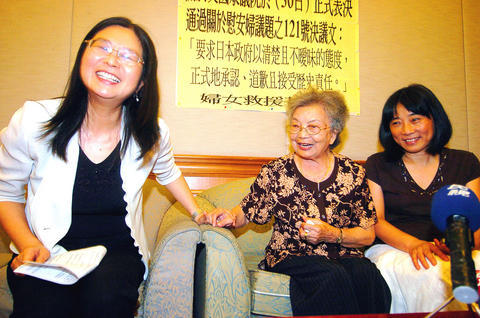Inspired by a US House of Representatives resolution seeking an apology from Japan to World War II-era "comfort women," the Taipei Women's Rescue Foundation and four female legislators yesterday urged Japanese Prime Minister Shinzo Abe to face the issue with a "political conscience."
The US House of Representatives on Monday passed a nonbinding resolution demanding "an official, unequivocal and unambiguous apology for the indignity the comfort women suffered."
Foundation executive director Fran Gau (

PHOTO: LU PEI-DER, TAIPEI TIMES
Wu Hsiu-mei (吳秀妹), a 91-year-old woman who was forced to work as a "comfort woman" during World War II, said she was happy when she heard of the resolution.
"My health was ruined [by being a `comfort woman'] when I was young ... The Japanese government is shameless for not wanting to admit [the `comfort women' program]," she said.
"The resolution represents the fact that the world hopes Japan would look at the harm it did during World War II, particularly the harm to the most disadvantaged `comfort women,' with a different attitude," Chinese Nationalist Party (KMT) Legislator Joanna Lei (雷倩) said.
"If Japan can own up to its war crime and apologize for this `historical shadow,' it can also release itself from the fetters of the past," Lei said, urging Japan to use the resolution as an opportunity for reflection.
"As we can see, many of the women are very old now. How many of them will live to see an apology [from Japan]?" she said. "Belated justice is not justice."
Democratic Progressive Party Legislator Huang Sue-ying (
Gau and the legislators urged the Ministry of Foreign Affairs to offer more assistance to surviving comfort women.
Gau said that the foundation and eight former "comfort women" will proteste in front of the Interchange Association (Taipei Office) on Aug. 15 -- the anniversary of Japan's surrender in World War II.

Alain Robert, known as the "French Spider-Man," praised Alex Honnold as exceptionally well-prepared after the US climber completed a free solo ascent of Taipei 101 yesterday. Robert said Honnold's ascent of the 508m-tall skyscraper in just more than one-and-a-half hours without using safety ropes or equipment was a remarkable achievement. "This is my life," he said in an interview conducted in French, adding that he liked the feeling of being "on the edge of danger." The 63-year-old Frenchman climbed Taipei 101 using ropes in December 2004, taking about four hours to reach the top. On a one-to-10 scale of difficulty, Robert said Taipei 101

Nipah virus infection is to be officially listed as a category 5 notifiable infectious disease in Taiwan in March, while clinical treatment guidelines are being formulated, the Centers for Disease Control (CDC) said yesterday. With Nipah infections being reported in other countries and considering its relatively high fatality rate, the centers on Jan. 16 announced that it would be listed as a notifiable infectious disease to bolster the nation’s systematic early warning system and increase public awareness, the CDC said. Bangladesh reported four fatal cases last year in separate districts, with three linked to raw date palm sap consumption, CDC Epidemic Intelligence

US climber Alex Honnold left Taiwan this morning a day after completing a free-solo ascent of Taipei 101, a feat that drew cheers from onlookers and gained widespread international attention. Honnold yesterday scaled the 101-story skyscraper without a rope or safety harness. The climb — the highest urban free-solo ascent ever attempted — took just more than 90 minutes and was streamed live on Netflix. It was covered by major international news outlets including CNN, the New York Times, the Guardian and the Wall Street Journal. As Honnold prepared to leave Taiwan today, he attracted a crowd when he and his wife, Sanni,

Taiwanese and US defense groups are collaborating to introduce deployable, semi-autonomous manufacturing systems for drones and components in a boost to the nation’s supply chain resilience. Taiwan’s G-Tech Optroelectronics Corp subsidiary GTOC and the US’ Aerkomm Inc on Friday announced an agreement with fellow US-based Firestorm Lab to adopt the latter’s xCell, a technology featuring 3D printers fitted in 6.1m container units. The systems enable aerial platforms and parts to be produced in high volumes from dispersed nodes capable of rapid redeployment, to minimize the risk of enemy strikes and to meet field requirements, they said. Firestorm chief technology officer Ian Muceus said